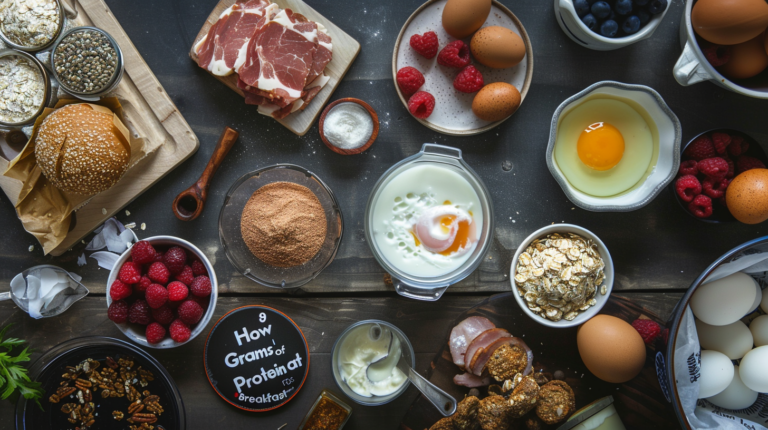Table of contents
Introduction
Starting your day with a high-protein breakfast can set the tone for a productive morning and overall well-being. Consuming 40 grams of protein in the morning not only fuels your body but also provides numerous health benefits. Whether you’re aiming to build muscle, lose weight, or simply maintain a balanced diet, ensuring you get adequate protein at breakfast is crucial.
Incorporating protein-rich foods into your morning meal can help sustain your energy levels throughout the day. For instance, a breakfast consisting of eggs, Greek yogurt, or a protein smoothie can make a significant difference. By focusing on high-protein options, you can avoid mid-morning hunger pangs and stay fuller for longer.
Additionally, a protein-packed breakfast has been shown to improve cognitive function and support muscle synthesis. This is particularly important for those with active lifestyles or fitness goals. For further ideas on incorporating high-protein breakfast foods, check out these.
Understanding Protein
Protein is an essential macronutrient that plays a crucial role in various bodily functions. It is composed of amino acids, which are the building blocks of muscles, tissues, and cells. Consuming enough protein is vital for maintaining and repairing body tissues, producing enzymes and hormones, and supporting overall health.
The daily protein requirements vary based on factors such as age, sex, and activity level. Generally, the recommended dietary allowance (RDA) for protein is 0.8 grams per kilogram of body weight. However, for those looking to build muscle or engage in regular physical activity, higher protein intake may be necessary. Consuming 40 grams of protein at breakfast can significantly contribute to meeting your daily protein needs.
Understanding why 40 grams of protein is beneficial at breakfast involves recognizing its impact on satiety and muscle synthesis. Protein-rich foods are more satiating than carbohydrates or fats, helping you feel fuller for longer and reducing overall calorie intake. Additionally, protein stimulates muscle protein synthesis, essential for muscle growth and repair, especially after exercise.
Various protein-rich foods can help you reach this 40-gram target. For example, a combination of eggs, Greek yogurt, and lean meats can provide a substantial amount of protein. Similarly, plant-based options like tofu, legumes, and nuts can also contribute significantly to your protein intake.
To learn more about protein intake and its importance, you can visit Harvard T.H. Chan School of Public Health’s nutrition source.
Benefits of a Having 40 Grams of Protein at Breakfast
A high-protein breakfast offers numerous benefits that can positively impact your health and daily performance. Consuming 40 grams of protein in the morning can provide sustained energy levels, improved muscle synthesis, enhanced satiety, and better cognitive function.
Firstly, a protein-rich breakfast helps maintain steady energy levels throughout the day. Unlike high-carbohydrate meals, which can lead to energy spikes and crashes, protein is digested more slowly, providing a more consistent energy release. This can help you stay focused and productive until your next meal.
Moreover, protein plays a critical role in muscle synthesis. For those engaging in regular physical activity or aiming to build muscle, consuming protein in the morning is essential. It helps repair and build muscle tissues that are broken down during exercise, promoting muscle growth and recovery.
A high-protein breakfast also enhances satiety, helping you feel fuller for longer. This can aid in weight management by reducing the likelihood of mid-morning snacking and overeating later in the day. Foods like eggs, Greek yogurt, and protein shakes are excellent choices for keeping hunger at bay.
In addition to physical benefits, protein has been shown to improve cognitive function. It provides the necessary amino acids that support neurotransmitter production, which is crucial for brain function. Starting your day with a high-protein meal can enhance mental clarity and focus.
Food Options To reach 40 Grams of Protein at Breakfast
Choosing the right foods is essential to achieve your goal of 40 grams of protein at breakfast. Here are some excellent high-protein breakfast options, divided into animal-based and plant-based sources.
Animal-Based Protein Sources
- Eggs: A versatile and popular choice, eggs provide about 6 grams of protein each. Scramble three eggs, and you’ve already got 18 grams of protein.
- Greek Yogurt: A single cup of Greek yogurt contains around 20 grams of protein. It’s also rich in probiotics, which are beneficial for gut health.
- Cottage Cheese: Another dairy option, cottage cheese offers approximately 14 grams of protein per half-cup serving.
- Lean Meats: Options like turkey or chicken breast can easily add a protein punch to your morning meal. Just 3 ounces of cooked turkey breast provides about 25 grams of protein.
- Protein Shakes: Whey or casein protein powders can be mixed with water or milk for a quick and easy high-protein breakfast. One scoop of whey protein powder typically contains around 20-25 grams of protein.
Plant-Based Protein Sources
- Tofu and Tempeh: These soy-based foods are excellent sources of protein. Half a cup of tofu provides about 10 grams of protein, while the same amount of tempeh offers about 15 grams.
- Legumes and Beans: Incorporate beans into your breakfast with dishes like breakfast burritos. A cup of cooked lentils contains about 18 grams of protein.
- Nuts and Seeds: Adding nuts and seeds to your breakfast can boost your protein intake. Two tablespoons of chia seeds provide around 4 grams of protein.
- Plant-Based Protein Powders: Options such as pea or hemp protein powders are great for those following a vegan diet. A scoop typically contains around 20 grams of protein.
Checkout our Guide about How To Get 40 Grams of Protein Without Meat (With Recipes).
Combining these foods can easily help you reach the 40 grams of protein target. For example, a breakfast smoothie made with Greek yogurt, protein powder, and a handful of nuts can quickly add up to a high-protein meal. Additionally, you can mix and match various ingredients to keep your breakfast interesting and delicious.
Sample 40g Protein Breakfast Menus

Creating a breakfast that delivers 40 grams of protein doesn’t have to be challenging. Here are three sample menus to inspire your morning meals:
Classic American Breakfast
- 3 Scrambled Eggs: Eggs are a protein powerhouse, with each egg providing about 6 grams of protein. Three scrambled eggs give you 18 grams of protein.
- 1 Cup Greek Yogurt: Adding a cup of Greek yogurt boosts your protein intake by another 20 grams.
- 1 Slice Whole-Grain Toast: While primarily a source of carbohydrates, a slice of whole-grain toast adds around 2 grams of protein, bringing this meal’s total to 40 grams of protein.
Vegan High-Protein Breakfast
- Tofu Scramble with Vegetables: Half a cup of tofu provides about 10 grams of protein. Adding vegetables not only enhances the flavor but also adds some protein and fiber.
- 2 Tablespoons of Peanut Butter on Whole-Grain Toast: Two tablespoons of peanut butter provide about 8 grams of protein, and the whole-grain toast adds another 2 grams.
- 1 Cup Soy Milk: A cup of soy milk contributes approximately 8 grams of protein. Together, this vegan breakfast delivers a total of 40 grams of protein.
Smoothie Bowl
- Protein Smoothie: Start with a scoop of whey protein powder, which typically contains 20-25 grams of protein. Blend it with water or milk, a handful of spinach, and half a banana for added nutrients.
- 1 Tablespoon Chia Seeds: Adding a tablespoon of chia seeds provides around 2 grams of protein.
- 1/2 Cup Cottage Cheese: Including half a cup of cottage cheese adds another 13 grams of protein. This combination easily reaches the 40-gram target.
By mixing and matching these ingredients, you can create numerous breakfast options that are both delicious and protein-rich. Experiment with different combinations to keep your meals exciting and to ensure you get the 40 grams of protein needed to start your day right.
Meal Prep Tips for High-Protein Breakfasts
Preparing a high-protein breakfast can be simplified with a bit of planning and preparation. Here are some practical meal prep tips to ensure you consistently reach your 40 grams of protein goal each morning.
Plan and Prepare in Advance
Taking some time on the weekend to plan your breakfasts for the week can save you a lot of hassle. Prepare ingredients in bulk, such as cooking a large batch of scrambled eggs or baking a protein-rich casserole. Store these in individual portions to grab and go throughout the week.
Quick and Easy Recipes
Focus on recipes that are quick and easy to prepare. Overnight oats with protein powder, yogurt parfaits, and smoothie bowls are excellent options that can be prepared the night before. Having a few go-to recipes can streamline your morning routine.
Storage and Reheating Tips
Use airtight containers to store your prepped meals in the refrigerator. For hot breakfasts like egg muffins or breakfast burritos, reheat them in the microwave for a quick meal. Keeping your breakfast components organized in the fridge will make it easier to assemble your meal in the morning.
Using Protein Supplements Effectively
Incorporate protein supplements like whey or plant-based protein powders into your breakfasts. They are versatile and can be added to smoothies, oatmeal, or even baked goods. This can help you reach your protein goals without much effort.
For more detailed tips on meal prepping, check out our guide on How to Meal Prep for a Week.
By following these meal prep tips, you can ensure that you have a high-protein breakfast ready to go, even on the busiest mornings. Consistency is key to achieving your nutritional goals and maintaining a healthy lifestyle.
Common Mistakes to Avoid
While aiming for a high-protein breakfast, it’s easy to make some common mistakes that can hinder your progress. Here are a few pitfalls to watch out for:
Over-Reliance on Protein Supplements
While protein supplements like whey or plant-based powders are convenient, relying too heavily on them can lead to a monotonous diet. It’s important to incorporate a variety of protein-rich foods to ensure you’re getting a range of nutrients.
Ignoring Variety and Balance
Focusing solely on protein and neglecting other macronutrients can be detrimental. A balanced breakfast should also include healthy fats and complex carbohydrates. For instance, pairing eggs with avocado and whole-grain toast not only provides protein but also essential fats and fiber.
Skipping Breakfast Due to Lack of Time
Many people skip breakfast because they feel they don’t have enough time in the morning. However, skipping breakfast can lead to overeating later in the day. Meal prepping in advance, as mentioned earlier, can help you avoid this issue and ensure you start your day with a nutritious meal.
Avoiding these common mistakes can help you stay on track with your high-protein breakfast goals and support your overall health.
Conclusion
Starting your day with a high-protein breakfast can bring numerous benefits, from sustaining energy levels and enhancing muscle synthesis to improving cognitive function and promoting satiety. By aiming for 40 grams of protein each morning, you can support your overall health and achieve your nutritional goals.
Incorporating a variety of protein-rich foods such as eggs, Greek yogurt, lean meats, tofu, and legumes ensures that your breakfast is both nutritious and satisfying. Planning and preparing your meals in advance can help you stick to your high-protein breakfast routine, even on the busiest mornings.
Avoid common mistakes like over-relying on protein supplements, neglecting balance, and skipping breakfast altogether. Instead, focus on a well-rounded meal that includes a mix of macronutrients. Real-life success stories from individuals like John, Emily, and Sarah highlight the transformative impact of a protein-rich morning meal.

